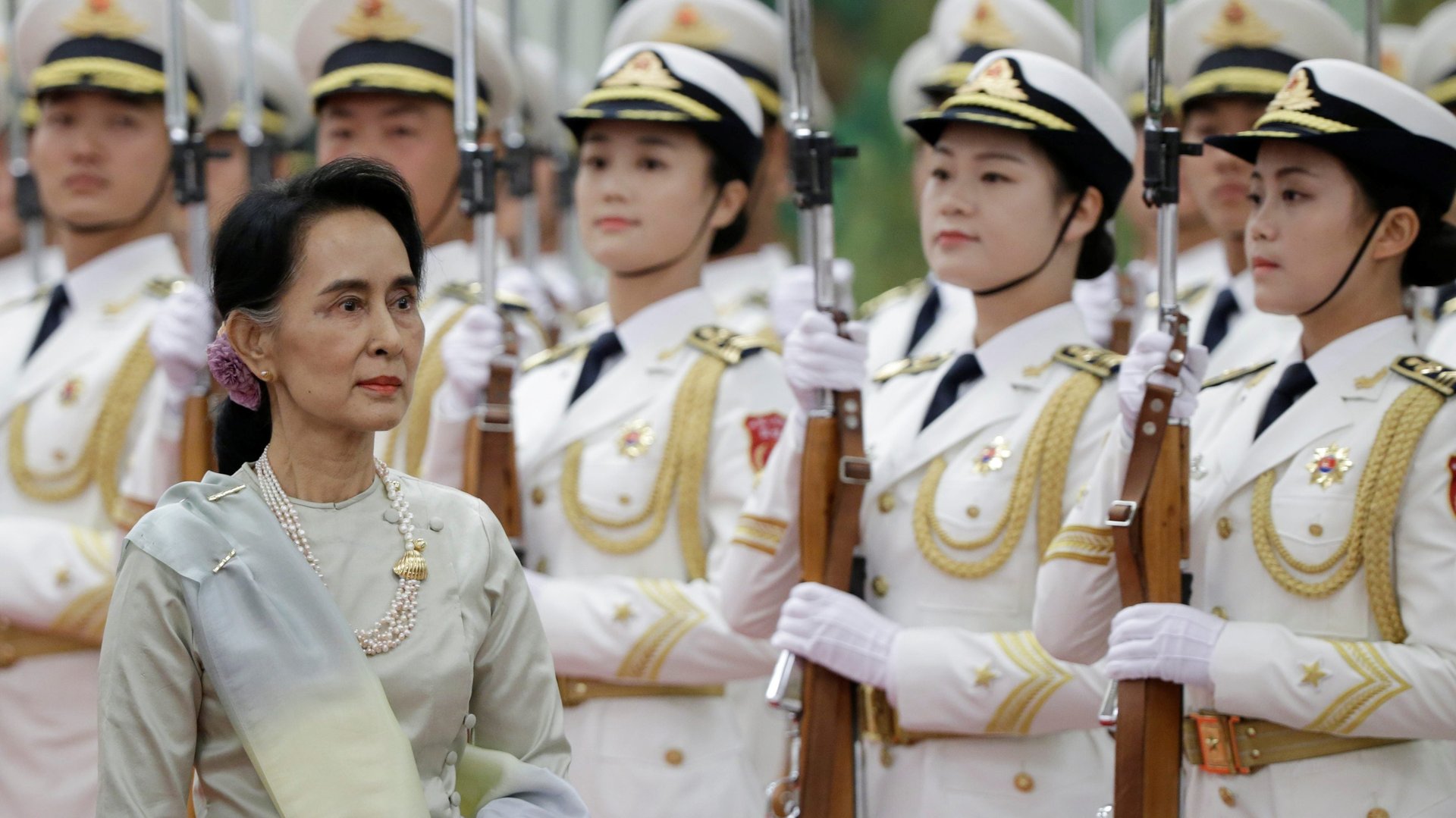As her peace icon image fades, Aung San Suu Kyi is winning over a new set of admirers in China
On Tuesday (Sept. 19), Nobel peace laureate Aung San Suu Kyi made her first major remarks on the crisis that has seen 400,000 Rohingya Muslims flee to Bangladesh since late August. While the speech will do little to assuage the criticism she’s facing from the international community, closer to home her reputation looks less tarnished.


On Tuesday (Sept. 19), Nobel peace laureate Aung San Suu Kyi made her first major remarks on the crisis that has seen 400,000 Rohingya Muslims flee to Bangladesh since late August. While the speech will do little to assuage the criticism she’s facing from the international community, closer to home her reputation looks less tarnished.
Suu Kyi has long been admired by many in China as having waged an exemplary fight for democracy against Myanmar’s military. That involved years of house arrest but eventually paved the way for elections that her party won in a landslide in 2015 (powerful government functions, like border affairs and internal security, remain with the army). The year of the election win, China’s Communist Party invited Suu Kyi and members of her party, the National League for Democracy, to Beijing, where she received a warm welcome, judging from online comments.
“After Mahatma Gandhi, Martin Luther King and Nelson Mandela, Aung San Suu Kyi has again proved to people the great power of non-violence, kindness, love, courage and persistence with her actions… it’s the very noble political awareness that made Aung San Suu Kyi another Gandhi, and won her the respect and honor from East Asia and the world,” read a post (link in Chinese) on Weibo by Feng Qingyang in June, 2015. The post has been shared nearly 1,000 times.
A social media comment included in a BBC article (link in Chinese) at the time of her visit said: “She is a Nobel Prize winner and has always been promoting values of democracy and freedom… She has started Myanmar’s democratic progress with her elegance and persistence.”
In recent days, many around the world have called for Suu Kyi lose her peace prize. She’s been blamed first for not speaking out against the reprisals the Rohingya have faced after a deadly attack by a Rohingya militant group on police posts—and then for saying the wrong things. Suu Kyi’s government has blocked humanitarian assistance to Rakhine, the state where Myanmar’s security forces have burned villages, and shot civilians, according to accounts from fleeing refugees. Yet comments about her on Chinese social media remain positive—this time from a more nationalistic crowd.
Suu Kyi’s apparent refusal to take a stance is largely shaped by her delicate balancing act with the military. But in China, some are seeing it as defiance in the face of unwarranted western pressure, and are praising her for resisting it.
“I used to think that Aung San Suu Kyi was the puppet for the western world, but I found her a true patriot,” commented Silent Workhorse, under a post about her speech.
At the official level, China has been supportive towards the Myanmar government, including backing its stance that it is fighting extremist terrorists in Rakhine, where China has made major investments in infrastructure. China also “understands and supports Myanmar government’s efforts towards domestic peace and ethnic reconciliation,” said (link in Chinese) China’s foreign ministry spokesperson Lu Kang at a Tuesday press conference.
On Weibo, China’s Twitter-like platform, some cited the relations with China as behind the criticism she’s facing. “Since Aung San Suu Kyi came on stage, she has been close to China, which is why the western [powers] want to vilify her on the matter of ethnicity and push her off the stage,” one commented (link in Chinese).
In remarks that came hours before the United Nation General Assembly was set to begin in New York, Suu Kyi, speaking in capital Naypyidaw, doubled down on Myanmar’s position and said that the country “doesn’t fear international scrutiny.” In China, some saw the decision to skip the UN, and more criticism, as a smart move that was in Myanmar’s best interests.
“[Suu Kyi] doesn’t care about the western value system and doesn’t fear the attack from them, [she] is the blessing for Myanmar people,” commented Dao Shengyi under a post (link in Chinese) on Suu Kyi’s missing the assembly.
“Aung San’s power isn’t given by the UN, nor is her paycheck, why would she listen to nonsense from the UN,” another wrote (link in Chinese).
China’s state-owned tabloid Global Times has also weighed in, saying that her handling of the crisis has won “cheers recently from the Chinese online communities who are routinely indignant over Western pressure on developing countries over issues concerning national security.” It also said that Suu Kyi is being seen as “a tough and wise woman who knows much better than Western politicians who make political correctness a business.”